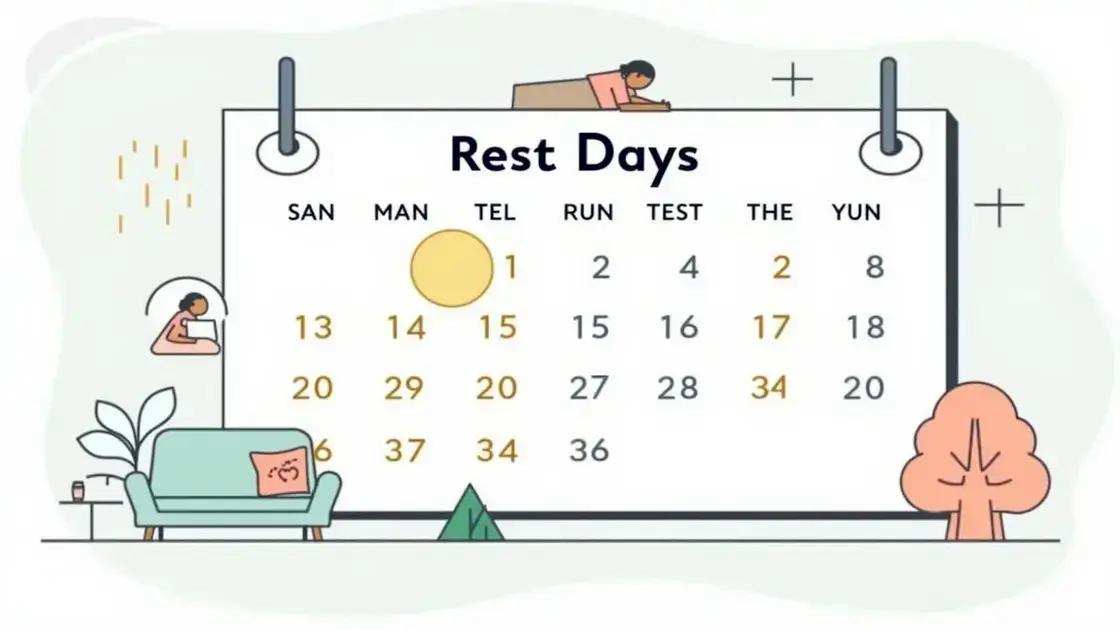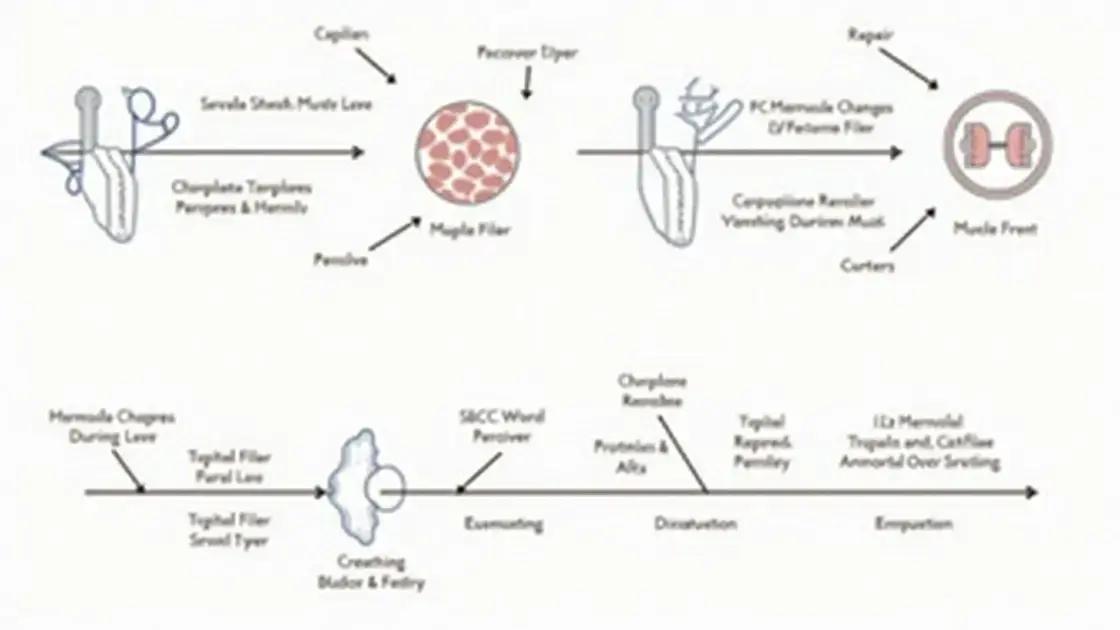The importance of rest days for muscle recovery and growth cannot be overstated; they allow your muscles to repair, prevent injuries, and optimize performance through proper nutrition and hydration.
When it comes to fitness, many enthusiasts overlook the critical role of rest days. The importance of rest days for muscle recovery and growth is often underestimated. While intense workouts are vital for building strength, giving your body adequate time to recover is equally essential. In this article, we will explore what rest days are, how they contribute to muscle recovery, and tips for making the most out of your rest days for optimum growth.
What Are Rest Days?

Rest days are vital periods in any fitness routine that allow your body to recover from intense workouts. They help prevent injuries and restore energy levels, which are crucial for muscle growth and overall performance. Incorporating rest days into your regimen is essential to maximize the benefits of your training.
Types of Rest Days
There are two main types of rest days: complete rest days and active rest days. On complete rest days, you refrain from any intense physical activity, allowing your muscles to recuperate fully. On the other hand, active rest days include light exercises, such as walking, yoga, or stretching, which keep your body moving without overtaxing it.
Why Are Rest Days Important?
During workouts, muscle fibers undergo stress and can sustain micro-tears. Rest days are crucial because they allow these fibers to heal and grow stronger. Lack of rest can lead to overstress, fatigue, and even injuries, which can set back your training goals significantly. In short, rest days play a key role in overall performance and progress.
Listening to Your Body
Another important aspect of rest days is learning to listen to your body. If you feel fatigued or notice persistent soreness, it might be time to take an additional rest day. Recognizing these signs ensures better recovery and long-term success in fitness.
How Rest Affects Muscle Recovery

Rest plays a crucial role in muscle recovery. When you exercise, especially during strength training, your muscles undergo stress and microscopic damage. This is a natural part of building strength, but it is during rest that your muscles repair and grow.
The Repair Process
When you rest, your body goes through several healing processes. Muscle fibers that were damaged during workouts begin to repair themselves, leading to growth and increased strength. This process is called muscle protein synthesis. Without adequate rest, your body cannot effectively carry out these repairs.
Hormonal Impact
Rest also influences your hormones. For example, during sleep, your body produces growth hormone, which helps in tissue growth and muscle repair. Insufficient rest can lead to lower levels of this hormone, hindering muscle recovery.
Inflammation and Fatigue
Consistent training without proper rest can lead to increased levels of inflammation and fatigue. This can hinder performance and slow down recovery. On the other hand, taking the necessary rest days reduces inflammation and allows your body to restore itself.
Impact on Performance
Inadequate rest can negatively affect your performance in future workouts. If your muscles are still recovering, you might struggle to lift weights or push yourself during aerobic exercises. By prioritizing rest, you’re setting yourself up for better performance in the long run.
Tips for Effective Rest Days

Implementing effective rest days is essential for maximizing recovery and reaping the full benefits of your workouts. Here are some valuable tips to make the most out of your rest days:
1. Schedule Rest Days
Plan your rest days just like your workout sessions. Consistency helps your body adapt and ensures that you prioritize recovery. Whether it’s one or two days a week, having a clear schedule is important.
2. Engage in Light Activities
Active rest can be very beneficial. Consider engaging in light activities such as walking, yoga, or swimming. These activities promote blood flow without putting stress on your muscles.
3. Focus on Sleep
Quality sleep is critical for recovery. Aim for 7-9 hours of sleep each night to allow your body to repair and rejuvenate. Establish a calming bedtime routine to improve sleep quality.
4. Stay Hydrated
Drink plenty of water to aid in muscle recovery. Proper hydration helps flush out toxins and supports nutrient delivery to your muscles. Aim for at least 64 ounces of water daily, or more depending on activity levels.
5. Incorporate Nutrient-Rich Foods
During rest days, focus on consuming nutrient-dense foods. Include protein for muscle repair, healthy fats for energy, and plenty of fruits and vegetables for vitamins and minerals. These nutrients will help your body recover faster.
6. Listen to Your Body
Pay attention to how you feel. If you’re still tired or sore, consider taking an additional rest day. Your body knows what it needs, so don’t be afraid to adjust your schedule when necessary.
The Role of Nutrition in Recovery

Nutrition plays a vital role in muscle recovery. The foods you consume significantly affect how well your body can heal after exercise. Proper nutrition enhances recovery by providing the necessary nutrients your muscles need to repair and grow stronger.
Key Nutrients for Recovery
There are several key nutrients to focus on:
- Protein: Essential for muscle repair, protein helps rebuild the muscle fibers that are broken down during workouts. Aim for high-quality sources like chicken, fish, eggs, and legumes.
- Carbohydrates: Carbs replenish glycogen stores that are depleted during intense exercise. Whole grains, fruits, and vegetables are excellent choices.
- Fats: Healthy fats support hormone production and help reduce inflammation. Include sources like avocados, nuts, and olive oil in your diet.
Timing Your Nutrition
The timing of your meals can also affect recovery. Try to consume a balanced meal with protein and carbohydrates within two hours after a workout. This helps kickstart the recovery process.
Stay Hydrated
Hydration is often overlooked in recovery. Water helps transport nutrients to your muscles and flush out toxins. Drink plenty of fluids throughout the day, and consider electrolyte drinks after intense sessions.
Supplements
While whole foods should be your primary source of nutrients, some supplements can aid recovery. Protein powders and branched-chain amino acids (BCAAs) are popular among athletes for muscle recovery.
Listen to Your Body
Finally, remember that everyone’s nutritional needs are different. Pay attention to how your body responds to certain foods and adjust your diet accordingly to optimize recovery.
In Summary: The Critical Role of Rest and Nutrition
Understanding the importance of rest days for muscle recovery and growth is essential for anyone engaged in physical training. Proper rest allows your body to repair itself, while effective nutrition provides the building blocks necessary for muscle recovery.
By scheduling rest days, engaging in light activities, and focusing on hydration and nutrition, you can optimize your recovery process. Remember, your body needs time to recover and the right nutrients to support muscle growth.
Incorporating these practices into your routine will not only improve your performance but also contribute to sustainable fitness and long-term health. So prioritize your rest and nutrition to achieve your fitness goals more effectively.
FAQ – Frequently Asked Questions about the Importance of Rest Days for Muscle Recovery and Growth
What are rest days and why are they important?
Rest days are periods in your training schedule where you allow your body to recover. They are important because they help prevent injuries and facilitate muscle repair and growth.
How do rest days affect muscle recovery?
Rest days are crucial for muscle recovery as they allow damaged muscle fibers to heal and grow stronger. This repair process is essential for optimal performance in future workouts.
What types of activities can I do on rest days?
On rest days, consider engaging in light activities such as walking, yoga, or swimming. These activities promote blood flow without overstraining your muscles.
How does nutrition impact muscle recovery?
Nutrition plays a vital role in muscle recovery by providing the essential nutrients your body needs for repair. A balanced diet with adequate protein, carbohydrates, and healthy fats supports this process.
What foods should I focus on for recovery?
Focus on nutrient-dense foods such as lean proteins, whole grains, fruits, and vegetables. Staying hydrated is also essential for recovering effectively.
How can I optimize my recovery with nutrition?
To optimize recovery, consume a balanced meal with protein and carbohydrates within two hours after a workout and maintain proper hydration levels throughout the day.













